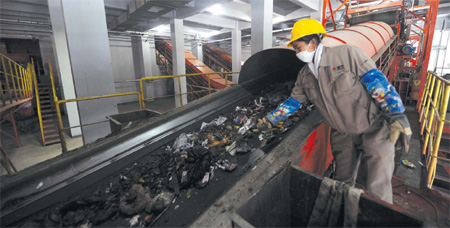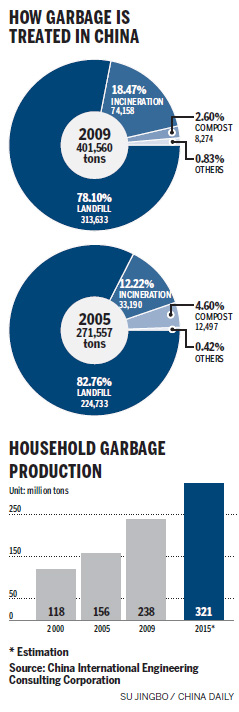Photos
China's burning issue: Scorch the garbage?
Updated: 2011-05-06 11:16
By Meng Jing (China Daily European Weekly)
|
|
Effort to incinerate waste to generate power gains ground, creating opportunities for foreign firms
The CEO of the largest waste management company in the world has one of the more unique answers to China's growing garbage problem.
"If you don't want garbage around you, why don't you eat your own garbage?" joked Jorge Mora, Asia CEO of Veolia Environnement.
For Mora, it was a joke to a very serious issue in China. As an executive at Veolia, which builds incineration plants and mainly builds landfills and landfill gas-to-energy plants in China, Mora has often heard the grumblings and opposition about incineration plants. It creates too much air pollutants, some say. Don't build it in my backyard, others say.
But in China, there has been very little progress in tackling how to recycle and sort garbage, coupled with the fact that there is also less and less available space for landfills. China overtook the United States in garbage output in 2004 and the amount of garbage has been rising at a clip of 8 to 10 percent a year.
Around 238 million tons of household garbage was produced in 2009 in China. The country's disposal facilities, according to China Association of Environmental Protection Industry (CAEPI), are
|
|
Many in the garbage industry, such as Mora, are calling for more incineration plants. To them, burning waste materials is the viable way to go, though environmentalists are firmly opposed to the practice.
"It is not about whether you like (incineration plants) or not. There is just no way out," Mora says.
As the world's second largest economy rapidly develops, consumption has skyrocketed. In its wake is an output of garbage that is building and building.
And according to CAEPI, there is actually more untreated garbage if annual figures take into account counties and towns, which are usually not well-equipped with disposal facilities.
The picture becomes bleaker by 2015 when about one-third of China's 700 landfills will reach their capacity, according to China International Engineering Consulting Corp.
This very grim outlook is fueling Mora's push for more incineration plants and betting on China's waste-to-energy industry.
"I have no doubts that incineration plants are needed in China more than landfills, just because available lands are scarce in China," Mora says.
He says he is expecting an annual 10-percent increase in Veolia's revenue in garbage management in China in the next five to 10 years. Veolia's revenue in China is about $1 billion and is regarded by company officials as an important source of revenue for the France-headquartered company, which made $54 billion globally last year.
The two waste-to-energy plants on the mainland and the six plants in Taiwan contribute a relatively small slice to Veolia's business in China, which has 37 projects in various types of disposal facilities.
Xu Haiyun, secretary-general for the municipal solid waste treatment committee with CAEPI, echoed Mora's sentiments, saying the number of incineration plants in China will likely double by the end of 2015.
"There are around 90 waste-to-energy plants in China and I think there will be at least another 80 to 90 in the next five years," Xu says.
For Xu, incineration is not just an unavoidable choice but a better choice.
"Landfills will generate more greenhouse gas emissions than incineration plants. And since the garbage is buried in the land, it has higher risks to contaminate underground water and the soil," Xu says, adding that the incineration technology is more advanced in treating garbage.
Xu says the reason that incineration was not widely used in China in the past is its high costs. The cost of treating 1 ton of garbage is 10 yuan (1 euro) to 100 yuan using by landfills (depending on the location); the cost is well above 100 yuan using incineration.
"But now the economic growth of China (allows the nation to) afford incineration, which is definitely more environmentally friendly than landfills," he says.
E-paper

War of the roses
European Chinese rose growers are beating their Chinese rivals at their own game
High-tech park gets big boost
At the source
Merchant of Venice
Specials

Bin Laden dead
The world's most wanted man was killed in a US raid in Pakistan.

British Royal Wedding
Full coverage of the royal wedding of Prince William and Kate Middleton in London. Best wishes

The final frontier
Xinjiang is a mysterious land of extremes that never falls to fascinate.


